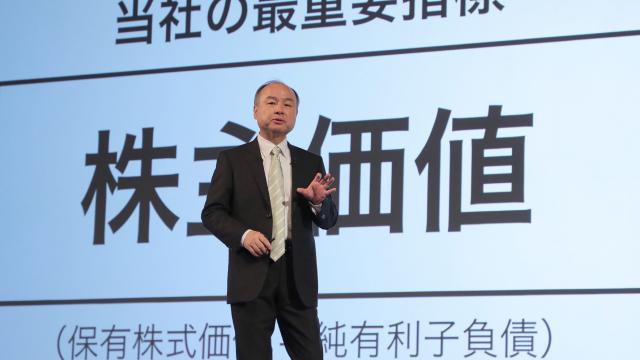Japanese investment titan SoftBank disclosed on Monday that it expects to take up to a $US16.7 ($26) billion loss for the past year in its Vision Fund, a key backer of huge, growth-at-all-costs tech firms like WeWork and Uber. According to the Wall Street Journal, that likely means its investments are worth less now than when it launched with $US100 ($156) billion in funding in 2017.
SoftBank was already having a tough time as coworking space company WeWork imploded following a failed initial public offering effort last year; SoftBank previously valued WeWork at a ridiculous $US47 ($73) billion and was forced to bail it out in a deal that valued it at just $US8 ($13) billion. WeWork is now in far deeper trouble, including a legal battle with SoftBank over a cancelled $US3 ($5) billion tender offer and the coronavirus pandemic, which has left it unable to pay rent at some locations. Uber’s IPO last year went badly, with the company continuing to hemorrhage cash and the pandemic slamming it with heavy losses; the Journal wrote that the Vision Fund’s multi-billion dollar stake in it is down nearly 20 per cent from the original price. Uber’s Chinese counterpart Didi Chuxing, which is also backed by the fund, is also doing poorly.
According to Barron’s, other Vision Fund-backed companies that have taken blows in recent months include budget Indian hotel chain Oyo Rooms, offsite construction company Katerra, Latin American food delivery app Rappi, pizza-making robot company Zume, and Brazilian gym network Gympass. Other bad bets have included dog-walking firm Wag, e-commerce biz Brandless, and car-sharing company Getaround. Satellite internet startup OneWeb, which was backed by SoftBank but not part of the Vision Fund, filed for bankruptcy in February after the coronavirus’s impact on markets helped scuttle plans to raise $US2 ($3) billion in new funding.
Per to the Journal, Son has tried to prop up SoftBank’s plunging shares (down almost 30 per cent in the last year) by agreeing to sell billions in assets to fund buying back up to $US18 ($28) billion in its stock and $US23 ($36) billion of its debt. A SoftBank forecast released on Monday said the firm expects an expected operating loss of $US12 ($19) billion and a net loss of $US7 ($11) billion for the year that ended on March 31, the paper wrote. That is SoftBank’s first annual loss in 15 years, according to Reuters. Those numbers could change as SoftBank finalises numbers but are unlikely to swing much more in its favour.
PitchBook venture capital analyst Kyle Stanford told the New York Times that while many other investment firms were writing down the value of their portfolios, “no other firm can match the scale of SoftBank” right now. He added that the Vision Fund “will have to choose its best investments to support” as the global economy enters what is anticipated to be a protracted, painful recovery from the pandemic.
Under Son’s leadership, the Vision Fund pushed companies to aggressively expand and poured billions towards growth at all costs. That resulted in many of those firms burning through cash with no end in sight, as well as an extremely risky reliance on a handful of huge investments to stay afloat. As the Journal noted, Son quickly grew the fund with money from Saudi and Abu Dhabi, though that came with strings attached that leave the fund in a terrible position right now:
Of the $US100 ($156) billion committed to the fund, 40% came via preferred stock sold to the Saudis and Abu Dhabi, constituting a debtlike security that pays an annual interest rate of 7% and allows the holders to get their money back before other Vision Fund investors including SoftBank. That structure can juice positive returns, but also magnify losses.
Meantime, the fund may not be able to backstop its cash-burning companies with follow-up investments because cash intended for that purpose might have to go toward paying interest to the preferred investors.
The “only reason all of these gambles haven’t completely destroyed SoftBank,” TechCrunch wrote, is that it continues to rake in solid returns from e-commerce firm Alibaba—the success of which Son touted while luring investors to the Vision Fund—and its core holdings in telecoms and semiconductor companies. As of February, efforts by SoftBank to start a second, $US108 ($169) billion fund were collapsing, with around half that money reportedly raised; prospects for that followup seem even dimmer now.
